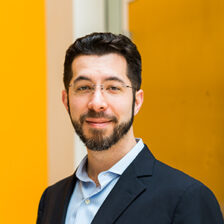Ed Boyden is Y. Eva Tan Professor in Neurotechnology at MIT, an investigator of the Howard Hughes Medical Institute and the MIT McGovern Institute and Yang Tan Collective, and professor of Brain and Cognitive Sciences, Media Arts and Sciences, and Biological Engineering at MIT. He leads the Synthetic Neurobiology Group, which develops ground truth-oriented tools for analyzing and repairing the brain, and applies them systematically to reveal fundamental mechanisms underlying brain functions, as well as to repair the brain. One ultimate goal of the group is to create biologically accurate computer simulations of entire brains, starting with small brains like those of worms and fish, and ultimately pointing towards the human brain. The group’s inventions include optogenetic tools, which enable control of neural activity with light; expansion microscopy, which enables ordinary microscopes to do nanoimaging; tools for multiplexed high-speed imaging of living biological signals; strategies to integrate the aforementioned toolsets towards the deconstruction and simulation of entire small brains; noninvasive brain stimulation strategies that may help with conditions ranging from Alzheimer’s to blindness; and new strategies for inexpensively creating 3-D nanotechnology, amongst many others. He co-directs the MIT Center for Neurobiological Engineering, which aims to develop new tools to accelerate neuroscience progress, and the K. Lisa Yang Center for Bionics, which pioneers transformational bionic interventions across a broad range of conditions affecting the body and mind. He is a faculty member of the MIT Center for Environmental Health Sciences, Computational & Systems Biology Initiative, and Koch Institute.
Amongst other recognitions, he has received the Wilhelm Exner Medal (2020), the Croonian Medal (2019), the Lennart Nilsson Award (2019), the Warren Alpert Foundation Prize (2019), the Rumford Prize (2019), the Canada Gairdner International Award (2018), the Breakthrough Prize in Life Sciences (2016), the BBVA Foundation Frontiers of Knowledge Award (2015), the Carnegie Prize in Mind and Brain Sciences (2015), the Jacob Heskel Gabbay Award (2013), the Grete Lundbeck Brain Prize (2013), the NIH Director’s Pioneer Award (2013), and the Perl/UNC Neuroscience Prize (2011). He was named to the World Economic Forum Young Scientist list (2013) and the Technology Review World’s “Top 35 Innovators under Age 35” list (2006), and is an elected member of the National Academy of Sciences (2019), the American Academy of Arts and Sciences (2017), the National Academy of Inventors (2017), and the American Institute for Medical and Biological Engineering (2018). His group has hosted hundreds of visitors to learn how to use new biotechnologies, and he also regularly teaches at summer courses and workshops in neuroscience, and delivers lectures to the broader public (e.g., TED (2011), TED Summit (2016), World Economic Forum (2012, 2013, 2016)).
Ed received his Ph.D. in neurosciences from Stanford University as a Hertz Fellow, working in the labs of Jennifer Raymond and Richard Tsien, where he discovered that the molecular mechanisms used to store a memory are determined by the content to be learned. In parallel to his PhD, as an independent side project, he co-invented optogenetic control of neurons, which is now used throughout neuroscience. Previously, he studied chemistry at the Texas Academy of Math and Science at the University of North Texas, starting college at age 14, where he worked in Paul Braterman’s group on origins of life chemistry. He went on to earn three degrees in electrical engineering and computer science, and physics, from MIT, graduating at age 19, while working on quantum computing in Neil Gershenfeld’s group. His personal dream is to understand the nature of human existence, and to engineer improvements thereupon. Long-term, he hopes that understanding how the brain generates the mind will help provide a deeper understanding of the human condition, and help humanity achieve a more enlightened state. His full CV is posted here.
